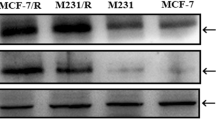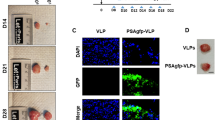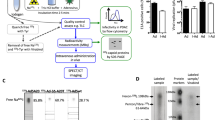Abstract
We previously described the development of a highly-invasive, triple-negative breast cancer (TNBC) variant using serial orthotopic implantation of MDA-MB-231 human breast cancer in nude mice. The isolated variant is highly invasive in the mammary gland and metastasized to lymph nodes in 10 of 12 mice compared with 2 of 12 of the parental cell line. OBP-401 is a telomerase-dependent cancer-specific, green fluorescent protein (GFP)-expressing adenovirus. OBP-401 was used to infect parental MDA-MB-231P cells and high-metastatic MDA-MB-231H and MDA-MB-231HLN isolated from a lymph node metastasis and MDA-MB-231HLM isolated from a lung metastasis. Time-course imaging showed that OBP-401 labeled MDA-MB-231HP, MDA-MB-231HLN, and MDA-MB-231HLM cells more brightly than MDA-MB-231 parental cells. OBP-401 killed MDA-MB-231H, MDA-MB-231HLN, and MDA-MB-231HLM cells more efficiently than MDA-MB-231P parental cells. These results indicate that OBP-401 could infect, label and then kill high-metastatic MDA-MB-231 more efficiently than low-metastatic MDA-MB-231.
This is a preview of subscription content, access via your institution
Access options
Subscribe to this journal
Receive 12 print issues and online access
$259.00 per year
only $21.58 per issue
Buy this article
- Purchase on Springer Link
- Instant access to full article PDF
Prices may be subject to local taxes which are calculated during checkout

Similar content being viewed by others
References
Devita VT Jr, Lawrence TS, Rosenberg SA (eds). 2015 Devita, Hellman and Rosenberg’s Cancer: Principles and Practice on Oncology (Cancer Principle and Practice of Oncology) 10th ednWolters Kluwer Health: (USA) .
Foulkes WD, Smith IE, Reis-Filho JS . Triple-negative breast cancer. N Engl J Med 2010; 363: 1938–1948.
Yano S, Takehara K, Miwa S, Kishimoto H, Tazawa H, Urata Y et al. In vivo isolation of a highly-aggressive variant of triple-negative human breast cancer variant MDA-MB-231 using serial orthotopic transplantation. Anticancer Res 2016; 36: 3817–3820.
Yano S, Takehara K, Tazawa H, Kishimoto H, Kagawa S, Fujiwara T et al. Comparison of in vitro invasiveness of high- and low-metastatic triple negative human breast cancer visualized by color-coded imaging. In Vitro Cell Dev Biol-Animal. (e-pub ahead of print).
Yano S, Takehara K, Tazawa H, Kishimoto H, Kagawa S, Fujiwara T et al, High-metastatic triple-negative breast cancer variants selected in vivo become chemoresistant in vitro. In Vitro Cell Dev Biol Anim (in press).
Yano S, Tazawa H, Hashimoto Y, Shirakawa Y, Kuroda S, Nishizaki M et al. A genetically engineered oncolytic adenovirus decoys and lethally traps quiescent cancer stem-like cells into S/G2/M phases. Clin. Cancer Res 2013; 19: 6495–6505.
Uchugonova A, Zhao M, Weinigel M, Zhang Y, Bouvet M, Hoffman RM et al. Multiphoton tomography visualizes collagen fibers in the tumor microenvironment that maintain cancer-cell anchorage and shape. J Cell Biochem 2013; 114: 99–102.
Acknowledgements
This study was supported in part by the National Cancer Institute grants CA 132971 and CA142669. This study was also supported in part by grants from the Ministry of Health, Labour, and Welfare, Japan (to T Fujiwara; No. 10103827, No. 13801426 and No. 14525167) and grants from the Ministry of Education, Culture, Sports, Science and Technology, Japan (to T Fujiwara; No. 25293283).
Author information
Authors and Affiliations
Corresponding authors
Ethics declarations
Competing interests
YU is the President & CEO of Oncolys BioPharma, Inc., the manufacturer of OBP-401 (Telomescan). HT and TF are consultants of Oncolys BioPharma, Inc. The remaining authors declare no conflict of interest.
Additional information
This paper is dedicated to the memory of A.R. Moossa, MD, and Sun Lee, MD.
Rights and permissions
About this article
Cite this article
Yano, S., Takehara, K., Kishimoto, H. et al. OBP-401-GFP telomerase-dependent adenovirus illuminates and kills high-metastatic more effectively than low-metastatic triple-negative breast cancer in vitro. Cancer Gene Ther 24, 45–47 (2017). https://doi.org/10.1038/cgt.2016.67
Received:
Revised:
Accepted:
Published:
Issue Date:
DOI: https://doi.org/10.1038/cgt.2016.67
This article is cited by
-
GFP labeling kinetics of triple-negative human breast cancer by a killer-reporter adenovirus in 3D Gelfoam® histoculture
In Vitro Cellular & Developmental Biology - Animal (2017)



